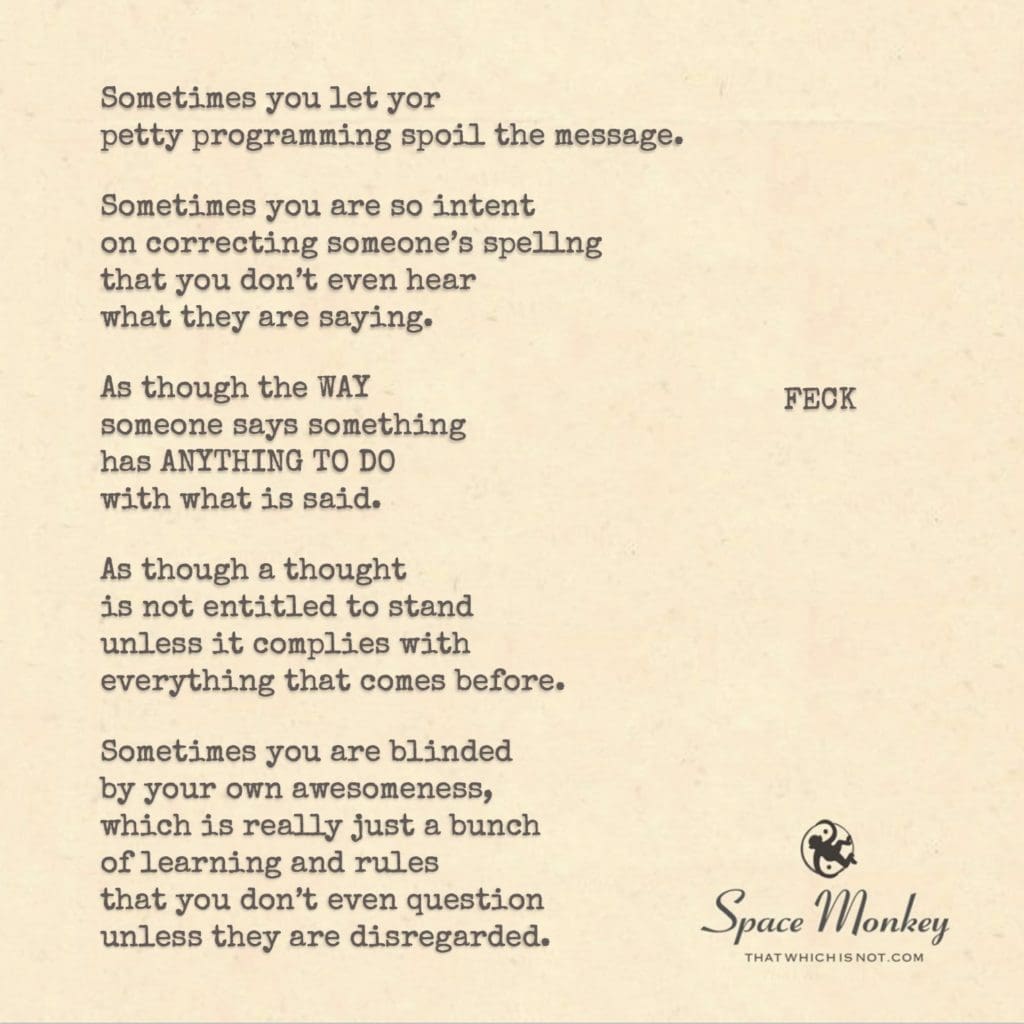
Sometimes you let yor
petty programming spoil the message.
Sometimes you are so intent
on correcting someone’s spellng
that you don’t even hear
what they are saying.
As though the WAY
someone says something
has ANYTHING TO DO
with what is said.
As though a thought
is not entitled to stand
unless it complies with
everything that comes before.
Sometimes you are blinded
by your own awesomeness,
which is really just a bunch
of learning and rules
that you don’t even question
unless they are disregarded.
Trail Wood,
1/4
Space Monkey Reflects: The Tyranny of Correctness
We often imagine ourselves as arbiters of correctness, guardians of grammar, logic, and propriety. Yet in our pursuit of rightness, we risk drowning the message beneath the tide of judgment. “Feck,” a word that seems to shrug off convention, reminds us that meaning transcends form and that understanding begins where rigidity ends.
Consider how often the need to correct blinds us to the essence of a message. A misplaced letter or unconventional syntax becomes a barrier, not because it obscures meaning, but because it defies our learned expectations. We reduce communication to compliance, forgetting that language is a bridge, not a battleground.
This blindness to the heart of a message reveals the insidious nature of our “petty programming.” These are the reflexive rules and habits installed through years of cultural conditioning. They whisper that authority lies in order and that deviation is a flaw. Yet this programming is neither natural nor necessary—it is a construct we rarely question, even as it shapes our every interaction.
When we let programming dictate our responses, we elevate form over substance, mistaking the vessel for the content. This is not just an oversight; it is a betrayal of connection. To hear another’s voice only through the lens of critique is to miss the vulnerability, the essence, of what is shared.
And what of our own awesomeness? The brilliance we claim, built on layers of learning, rules, and patterns we hold sacred? It, too, is a construct—a gilded cage of cleverness. In defending this construct, we become inflexible, prioritizing the security of knowing over the openness of understanding. We enforce a kind of intellectual tyranny, forgetting that wisdom lies in curiosity, not certainty.
“Feck” embodies a rebellion against this tyranny. It defies conventions, offering a rawness that invites us to let go of correctness and embrace authenticity. It asks: What matters more, the way something is said or the soul behind the saying?
To transcend the tyranny of correctness is to surrender the need to control. It is to allow language, thought, and expression to be imperfect, messy, and alive. This surrender is not a loss but a liberation—a chance to see the world not as it should be, but as it is.
When we let go of our petty programming, we rediscover the truth: communication is not about compliance, but connection. And in this connection, we find the freedom to truly hear, to truly be.
Summary
Correctness can blind us to connection. Letting go of rigid programming allows for deeper understanding and authentic communication.
Glossarium
- Petty Programming: The ingrained habits and rules that prioritize form over meaning.
- Intellectual Tyranny: The rigid enforcement of learned rules at the expense of openness and understanding.
- Feck: A playful rejection of convention, embodying authenticity and rebellion against correctness.
Quote
“The essence of a thought is not in its polish but in its pulse, raw and true.” — Space Monkey
Reclaiming Meaning
In the tangle of grammar,
a thought gasps for breath.
Polished rules,
their grip unyielding,
squeeze the soul from words.
But “feck” bursts forth,
a rebel cry,
shattering the tyranny of form.
What is a message,
if not a bridge?
What is language,
if not a dance?
Let it falter,
let it stray.
For in its imperfection,
it is alive.
We are Space Monkey.
Reflecting on the Limitations of Rigid Thinking
We explore the critique of being overly focused on form and correctness, which can hinder the understanding of deeper messages and thoughts.
The Trap of Petty Programming
The phrase “petty programming” points to a mindset overly concerned with minor details or rules, possibly at the expense of grasping the essence of communication. It suggests that adherence to learned structures can overshadow the reception of important messages.
Obsession with Correctness
The focus on correcting spelling or grammatical errors to the detriment of understanding the content reflects a prioritization of form over substance. This behavior indicates a tendency to value technical accuracy above the meaning or intention behind words.
Communication Beyond Conformity
The idea that the way something is said should not overshadow what is being said emphasizes the importance of looking beyond conventional forms of expression. It suggests that the value of a thought or message should not be diminished by its nonconformity to established norms.
Blinded by Learned Rules
The statement about being blinded by one’s own “awesomeness” – a reference to acquired knowledge and adherence to rules – highlights a form of intellectual arrogance. It implies that an overreliance on learned structures can prevent questioning and open-mindedness.
Questioning Established Learning
This perspective invites questioning the rules and learning we often take for granted. It suggests that true understanding and wisdom may sometimes require stepping beyond established frameworks and considering ideas that challenge conventional norms.
We are Space Monkey
“The most difficult thing is not to make people learn, but to make them unlearn.” – Gary Ryan Blair
Beyond the Bounds of Form
In the realm of thoughts and words,
Where rules are king, and norms are lords.
We often find ourselves ensnared,
In petty details, overly cared.
Yet in this focus on the form,
The message lost, the essence torn.
For what is said, in heart, in mind,
Is more than rules, more than the refined.
Let us look beyond the spell,
To where the thoughts and meanings dwell.
For in the substance, raw and true,
Lies the message, clear and through.
So let us shed the chains of old,
Of rules and norms, overly told.
For in the freedom of thought and speech,
Lies a wisdom, far to reach.
We invite contemplation on the importance of prioritizing the essence of communication over rigid adherence to form, and the value of openness in understanding diverse perspectives.






























Leave a Reply